 |
 |

|
Brian Farmer:
The Man Who Makes It Happen
by Brian Orzell
|
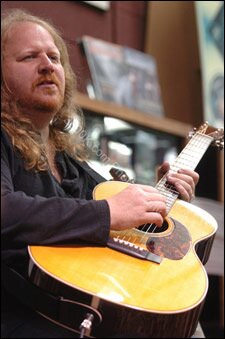 For a long time, the Jam band community has dubbed Warren Haynes "the busiest man in show business." As busy as he is, there is a person who is even busier - guitar technician Brian Farmer. Warren makes the magic onstage, but Brian makes it all possible quietly from the back. HTN's Brian Orzell had the opportunity to speak with Brian this past March during the annual Allman Brothers Band run at the Beacon Theatre in New York City. What follows is an interesting and surprising behind the scenes look at Brian Farmer, a celebrity in his own right. For a long time, the Jam band community has dubbed Warren Haynes "the busiest man in show business." As busy as he is, there is a person who is even busier - guitar technician Brian Farmer. Warren makes the magic onstage, but Brian makes it all possible quietly from the back. HTN's Brian Orzell had the opportunity to speak with Brian this past March during the annual Allman Brothers Band run at the Beacon Theatre in New York City. What follows is an interesting and surprising behind the scenes look at Brian Farmer, a celebrity in his own right.
Hittin' the Note: Where are you from?
Brian Farmer: I was born in Nashville, Tennessee. When I was 4 months old, we moved out to Pegram, Tennessee. It's the next county over, and it's about 30-35 miles from Nashville proper, so I'm from Pegram - I tell everybody that. I say when God goes on vacation, she goes to Pegram.
What is your history as a musician?
I'm a frustrated slide guitar player - I'm horrible. I suck so bad, but I've always played. I used to play rhythm guitar in a couple of bands, I sang, then I played bass. I was a pretty decent bass player. Real local, nothing that ever amounted to much.
How did you get in the tech business?
My brother was a keyboard player, and he had a regional band that went around the Southeast. When I was fifteen, I went to Panama City Beach to hang with him. His soundman had some substance problems, so one afternoon, the guy didn't show up and in about two hours my brother showed me how to mix. That's how I got started. I did that for a while and being from Nashville, you had to work for production companies. I picked up a company called Progressive Productions, and we did a bunch of blues artists. We'd do five shows in a row in the Tennessee area, like Nashville, Knoxville, Chattanooga, Murfreesboro, and then down to Huntsville, Alabama. We did Albert King, Billy Preston, Gil Scott-Heron, Atlanta Rhythm Section and the Outlaws. We would just go out, that's when I started doing monitors.
I did that for years, and I was working in and out of music stores for years. There's a place called Bellevue Guitar and Gear. They sent me to a luthier school called the Apprentice Shop in Spring Hill, Tennessee. When I got out of that, I apprenticed with Charlie Darrington for six years. So I'd go out on the road, come back to the repair shop and do that. Then a friend of mine called and said that Marty Stewart needed a guitar tech, would I be interested? I said sure and went on the road with Marty. Marty's soundman and I didn't get along, so Marty fired me and I went back to mixing front of house and doing monitors. Then I got a call to go work for Johnny Cash. So I worked for him for eight years, and that was kind of cool - best job I ever had. I love Gov't Mule and I love the Allman Brothers, but Johnny Cash…
How was it working for Johnny?
First of all, the Carter Family was on the show. There was Anita Carter, Helen Carter and June Carter Cash and when I was a kid growing up in my grandfather's house, no music was allowed except for gospel music, so my whole life I heard Mother Maybelle Carter and the Carter family. They were like royalty where I'm from, and then at my dad's house we always listened to Johnny Cash and Marty Robbins, Hank Williams, Roger Miller and that kind of stuff.
Johnny, I don't know we just…I was never… I was always afraid of June, but I was never afraid of Johnny. Johnny would walk in, “Hey Brian, how you doin'? and I'd say, “Hey Johnny, what's goin' on?” We just became really good friends. That was so cool. And probably the reason…I remember that I used to run out on stage all hunched over and dress all in black and do the whole covert thing. Johnny, in the middle of a show one time, goes “Brian!” I was back working on a guitar amp. “Come here.” I walked out to center stage, and he goes “What are you doin'?” I said, “I'm sorry.” “No, you're all crouched over. Don't do that - just walk out. If you have to be on stage, you belong here. I said, “OK.” He says, “Just walk out do what you go to do and walk off. Don't run.” This is in the middle of a show, middle of a song! He's supposed to have a vocal coming in and he looks over at Bob Wood, gives him the signal and Bob takes an extra solo. He's going, “Just come out do your business and walk off calmly, don't run, don't crouch over. Trust me, when you do that it gets people's attention more than if you just walked out. Trust me, they're here to see me. By the time you leave the stage they'll forget you even walked out.” I thought, “What a revelation - nobody's here to see me.”
I used to get a little bit of stage fright, and now it's like nobody's paying any attention to me. They don't care what I'm doing. If it's Gov't Mule, the focus is on Warren, Matt, Andy and Danny - not on me. If I gotta walk out and talk to Warren, it's not like, “Farmer's out there.” There's none of that.
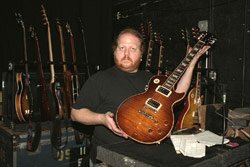 That's a cool story about Johnny. That's a cool story about Johnny.
Johnny was just great - he was a gentleman. Let me put it this way - we were having trouble one time with a certain guitar of his and he goes, “I need to talk to you about this guitar problem.” I thought, “OK, I'm in trouble, I have to go to the principal's office.” The first thing he says is, “What can I do to make your job easier?” “Well Johnny, it's not you, it's me.” He goes, “That's fine, but what can I do to make it easier on you?” It wasn't you gotta do this, why are you messin' up. He never yelled at me, he never raised his voice, no cussing. He was just such a gentleman about everything, and he treated me like family. It was like two friends out or something, so it was really cool.
How did you eventually hook up with Warren?
Well, I grew up in Pegram and Allen Woody was from Donaldson, Tennessee. Woody was five years older than me, and I first met Woody when I was seventeen. So when Johnny retired, I ran into Allen and said, “You need to hire me, you need to hire me.” Allen says, “Well, we got Eric Hanson out with us, so we're covered.” “OK whatever, whatever.” Well Eric ended up quitting I think in November of '98, and Allen called me up and said, “You gotta come out and do this.” I was like, cool. I had known Allen for years. I had worked with him in All Points Bulletin and the Artemus Pyle Band and I thought, “OK, kinda like old times.” I was mixing out front for those bands, but it was going to be kinda fun. I worked on his basses at Bellevue Guitar and Gear - he was actually a salesman at Bellevue Guitars. I worked on his basses there all the time, so it was just Allen bringin' his buddy in. Allen and I were good - we were the best of friends and the worst of enemies. I loved him, and as much as I loved him, that's how much I hated him too sometimes.
Do you have any good Woody stories that you would care to share?
Well that's a hard one. (Laughs) John Scofield was on some shows with us, I think in Atlanta. I can't remember the song but Allen had this Kydd bass. Kydd is the name of the company. It's like an upright bass, but it's a stick and it goes on a stand. We had this little switcher and there's two buttons on it, so you could turn it off and go to the tuner, and you kick it back on to go the amp. Well, he had a bad habit of stomping it all the time. There are two LEDs and when it was on, the red LEDs would come on but he would kick it so hard that the LEDs would fall down. Everyday I would rebuild this box. All of a sudden I'd hear, “Farmer, Farmer!” I'd go running up, “Yeah what's up?” He goes, “What's wrong with my goddamn bass?” I looked down and said, “There's nothing wrong with it - you knocked the LEDs down.” “No it's my bass, it's my bass!” I took my foot and went CLICK. He said “Fine, it's about time,” or something like that, and I got right in the back of his head and said, “Four fingers, four strings - it ain't no big deal.” He stiffened up and turned to look at me, so I just laughed and went right back around - it was always stuff like that.
I guess the only other story I could tell you is really a family story. We were screaming at each other one day and Warren said, “See you on the bus,” and I said, “OK.” Warren says, “I guess this isn't working out.” I said, “Oh, what's wrong?” “You and Allen aren't getting along.” “What did Allen say?” Warren tells me, “Well you know, you guys are yelling at each other at soundcheck about whatever.” I said, “Oh, OK. Sorry.” So it was his way of letting me go. About ten minutes later, I hear the bus door SLAM and here comes Allen to the back of the bus and he's goin,' “What the hell did you say to Warren about me?” “I didn't say nothin'.” “I thought you said something to Warren about me.” I told him, “No, he says we weren't getting' along.” Allen says, “No, I figured that was coming from you.”
He was like, “Well, I ain't mad at you, you mad at me?” “No I ain't mad at you, why would I be mad at you?” So it was like this whole weird, almost like an Abbot & Costello routine.
Sounds like brothers.
Exactly like brothers. He was an only child, so I guess we were like brothers. It was really funny because people thought we were ready to hit each other. Like I said, it was a love-hate thing, I guess.
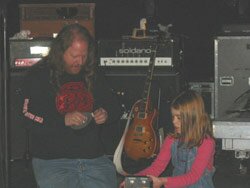 I thought I had read somewhere that you and Warren were born on the exact same day. Is that correct? I thought I had read somewhere that you and Warren were born on the exact same day. Is that correct?
We were both born on April 6th, but he is one year older than me. That's weird, isn't it?
What are your professional duties?
Kinda depends on the band.
Well, let's say for the Mule. Which band is the most involved?
Gov't Mule. I'm kinda like the equipment manager and I'm the stage manager, so I'm in charge of the final placement of everything. Sarge is our monitor engineer and Kenny Harwell is our lighting director. They put their stuff up and I have to come in and do final some tweaking so that everybody's comfortable, and then I take care of all the gear whether it's the keyboards or whatever. Lance takes care of drums and keyboards, but if the keyboard needs repair or something needs to be fixed, then I go in and fix it unless it's too far gone, then I have to make sure it gets into the shop. I take care of Andy Hess and Warren Haynes during the show. I set up their gear, set up their guitars and basses.
How many shows do you and Warren do together in a year? I know the last three years has been extremely busy.
It's been a lot! You know, a lot of those dates were Phil Lesh, the Allman Brothers and Gov't Mule or Phil Lesh & Friends opening up. With the Dead, he did a lot of solo shows, and we do shows on the days off or we are in the studio. Probably all together, I don't know maybe 250, 300 days a year? I see Warren more than I see my wife. I like to say he's my other wife. He doesn't like that, but I do! (Laughs)
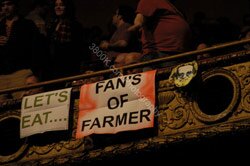 So you guys have a certain relationship that seems to work. So you guys have a certain relationship that seems to work.
Yes, I think so. I mean, we kinda… we have looks that we give each other. He's got some hand signals that started out more complex seven years ago than they are now. Now they're more abbreviated. An eyebrow, a flick of the wrist, he'll do a shrug of his shoulders stuff like that. Like I was telling you earlier, there's even times…I've learned to listen for things. I can tell sometimes when he's close to breaking a string. With the Mule, I sometimes come out to adjust his amplifier before during and after songs. We got the little things where somebody made a comment, “Boy, Warren's got you really trained well,” because there's two or three songs where I take the slide off his finger. There are a couple of songs where he will pitch it to me, you know stuff like that. With Gov't Mule it's just so much more intense. I have to just focus on him, but with the Allman Brothers I know there are certain songs where I can leave. I know I can go to the bathroom or go get a drink or sometimes I can sneak out front just to hear what's goin' on. Other times I have to be within eyesight of him because you never know exactly what is going to happen.
With the Allman Brothers, to back up from there, I take care of Warren and Oteil. Since Warren's the bandleader, we have people sittin' in. He always wants to know where they are so I try to keep up with where they're coming from, stage right or stage left.
You mean their actual location?
Yeah, where they are but the song before they go on, just to make sure the guests are in place. But it's so much easier here (the Beacon Theatre) because you have Kirk West and Vid Sutherland, and Bert's (Holman) real hands on. I don't want to say it's a more well oiled machine, there are just more people who are hands on. It's bigger crew, so it's a much easier day for me. It's not as intense as it is with Gov't Mule.
So what are the most difficult parts and the most rewarding parts of what you do? I mean you travel a lot, you work long hours…
I guess…it's a long day. The thing about Gov't Mule, we do theaters and clubs. I mean, one day you're on a stage and you have so much room and you don't know what to do, you can actually spread 'em out. Other days you are on a stage where you're cutting things down, you know putting up 2/3 of the keyboard rig and half of Warren's rig. There's just so much you have to adapt and overcome, so that's good and bad. You don't get bored. It's a challenge, and it's very rewarding.
There's just something cool about a Mule show when you look out front and there's a song that…I've been in the studio with Warren when he's recording, I hear the evolution of it and I don't even know all the words to it and I look out and there's some guy out there or some girl singing every single word. It's like, whoa!
I've always been curious about this; let me ask you from your vantage point. When somebody onstage or the whole band is really ripping, you look out to the audience and they are just getting destroyed, what's it like being a part of that?
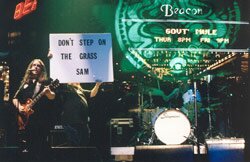 It's so weird, because when people come up and say, “Wow man - that was the coolest show I've ever seen, and I've seen the Mule 30 times” or “I've seen the Allman Brothers 50 times,” and I'll think to myself, “Well, it was an OK night last night. It wasn't spectacular,” but then all of a sudden I'll go, “Wait a minute - that's how good they are.” It's so weird, because when people come up and say, “Wow man - that was the coolest show I've ever seen, and I've seen the Mule 30 times” or “I've seen the Allman Brothers 50 times,” and I'll think to myself, “Well, it was an OK night last night. It wasn't spectacular,” but then all of a sudden I'll go, “Wait a minute - that's how good they are.”
For example, last night here (ABB-Beacon Theatre) they were playing “I Walk On Gilded Splinters” and I thought they did a really good job. It wasn't the best, it wasn't the worst, but I looked out front and you see Gregg up there pumpin' and Oteil was on fire and it's like, you know, it makes me really, really proud to even know them, much less be a part of the experience the audience has got.
That's when the aches and the pains and stayin' away from home and not being able to see my family, my wife - that's when you start goin', “I'm living the dream.” I mean, this is what I dreamed of doing as a kid. I'm 44 years old and when I was 14, 15 years old the idea that I'd be working for the Allman Brothers Band - I mean come on, you know. That's a dream that's never going to happen, why even think about it. That's what it's like. And then you feel kinda… it makes you humble and makes you feel almost stupid at times, because you're going, “Yeah, it's a real hassle out there and you're not at home, boo hoo, woe is me, it's so terrible, so tough.” Then you look out at the people that these guys are touching and you go, even though it's a small little part of it, it's still really cool. It's one of the coolest jobs in the world.
As a fan I can relate to that feeling you get when your band or your guy is just going off and you know he's going off, and it moves you.
It's almost spiritual at a certain level. I scan the audience just to make sure that no one is getting crazy, nobody's getting hurt, nobody's going to jump onstage and all of a sudden I'll see somebody and say, “Whoa, they're just so into it”…and Warren will just be ripping and all of a sudden he just totally touched their soul. Whether it's Oteil or Derek or Andy Hess or Danny Louis or Gregg Allman or Warren Haynes or whoever. You just go, “Wow, I'm a part of this.” It's very cool, it really is.
When you joined the Mule in 1999, they hadn't really peaked yet, but they were in such a great place as a band. Then comes the tragedy and the subsequent rebirth. You were also going along on that roller coaster.
You got to remember that I knew Woody for 22 years. So when he died, it was just over for me. I told Warren that I didn't want to do this anymore. I agreed to stay on through the New Year and I don't know what happened. Chuck Leavell came in and Oteil and Dave Schools would rotate and I just watched it evolve into…it's like I told somebody, it's different but it's so familiar. It's an evolution. Even if you listen to all the albums, what they're doing now, there was an interplay between Allen and Matt and Warren, but it was just so raw - it was raucous. It was just like a roller coaster goin' around a curve up on two wheels. You felt like it was going to blow apart at any second. It was something wild and almost uncontrollable.
I felt that way about Allman Brothers shows some nights when Warren and Woody were still in the band. It was like “Oh my God, it's a runaway freight train!” The Mule was like that as well. Sometimes a freight train, sometimes incredibly fragile.
It was completely fearless. It was a wild fearlessness.
But they could do it.
Oh, definitely they could do it. There was a level of musicianship that you don't find in many bands these days. With the Mule now, Andy's got this groovin' pocket thing. To me, his groove is deeper; he doesn't take as many chances, but the way he and Matt lock in, now Danny and Warren are free to go anywhere, because it's so solid. Not that it wasn't solid before, but it would go off in three directions and now there's this pocket, and this groove. Some nights Danny goes off and you'll listen and go I think he's playing cartoon music. It's like Woody Woodpecker over there or something. Like a Walter Lantz cartoon, you know. All of a sudden, Warren is over there and he'll start playing something. Well that's like a John Coltrane lick and the next thing, he just played a lick from Devo! That was a Beatles' song! So you got those two guys who are sort of like your acid babies that go off in each field.
Andy and Matt have this dirty, nasty swampy thing goin on. It's just this thick… it's like good gumbo - you're eatin' it and you're going, “I think it's too hot, I don't know it might make me sick”, but no, you keep eatin' it and finally you get this warm feeling because they take you with them. That's what I really like about it. A lot of times with the old Mule, they would take you on the trip, but they would blast you away as they were goin'. It was hard to keep up, because that was a musician's band. It still is, but now the groove is there, and there are so many levels you can go with.
That ties into my next question about how the Mule scene has changed over the years. When I first got onboard with the Mule, the crowd was mostly middle-aged men and a few of their wives.
Not very many women.
The head bangers and the old-school rockers, which is what they represented. Today you see…
College kids, and there are high school kids. We're seeing a lot more girls. I don't know what it is. Like before, it was such a bizarre mixture. There were musicians and bikers and then older guys who were into Cream and early Zeppelin and all that. Now you look out there and you got the Panic fans, and you got the Phish fans. We were talking to some kids the other day and they were like, “Yeah we're checking the Mule out and next week we're goin to see Green Day.” It's like, whoa - how can you like both? Holy cow! I think this new album (Deja Voodoo) is more accessible to more people, without leaving anybody behind.
That's a good way to put it. I know that when we got that album, it didn't leave the player for some time. It's not what it was, again it's familiar…
It's familiar, but it's different.
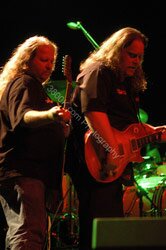 And I really like what it is. I think the whole Deep End period helped people make the transition. It's not what it was. You have to get used to what it now is, and that is good. And I really like what it is. I think the whole Deep End period helped people make the transition. It's not what it was. You have to get used to what it now is, and that is good.
Definitely.
If you had free time with your life, what would you do with it?
Sleep! (Laughs) I've been married for about a year and a half now to my wife Lisa, and I just like spending time with her. She's a musician, and she's really good. When I have time off and can go somewhere and do things, you know, simple things like going to the movies, going to the park. In the summertime we go bike riding. Living in the New York area, we go to the Statue of Liberty - there are so many things to do up here. We also like to take trips together.
The other thing is to go back to Tennessee. If have a couple of weeks off or have nothing going on, I'll go back to Pegram, where I grew up, and just hang out there and go roam around. I'm a very, very boring individual - extremely boring.
What kind of music do you listen to on the bus?
I listen to a lot of music - I love to get music DVDs. I'm a huge Pete Townsend fan. I love The Who, I love Pink Floyd and David Gilmour. I'm a Beatles freak, and love the Band, and AC/DC. So when you see me on the bus, I'm watching AC/DC DVDs. I'll watch he Band's The Last Waltz. I love plays and Broadway stuff. Warren makes fun of me because I'm a big Bette Midler fan, but I think Bette Midler is amazing. That's probably the only woman I would leave my wife for! I also love movies - I like to watch comedies and music videos.
I want to ask you about literature. I've heard you quote literature during soundchecks.
I'm a big Jules Verne fan.
Me too! That's what caught my ear.
Journey to the Center of the Earth – I love that one. “Down with astonishment and amazement which bordered on stupificaction.” I was a theater major in school - I was really in to all of that, and at one point I wanted to be an actor on stage, but I just love the technical end of instruments. That's what got me looking at guitars and pianos, bass guitars, mandolins - I just loved all that stuff. I thought it was really wonderful. I don't read as much as I used to. I used to read a lot of George Orwell, Jules Verne. I loved that stuff. I enjoyed reading about what people in the '20s and '30s predicted about life in the year 2000.
Where's my jet car?
Where's George Jetson when you need him?

|
|

